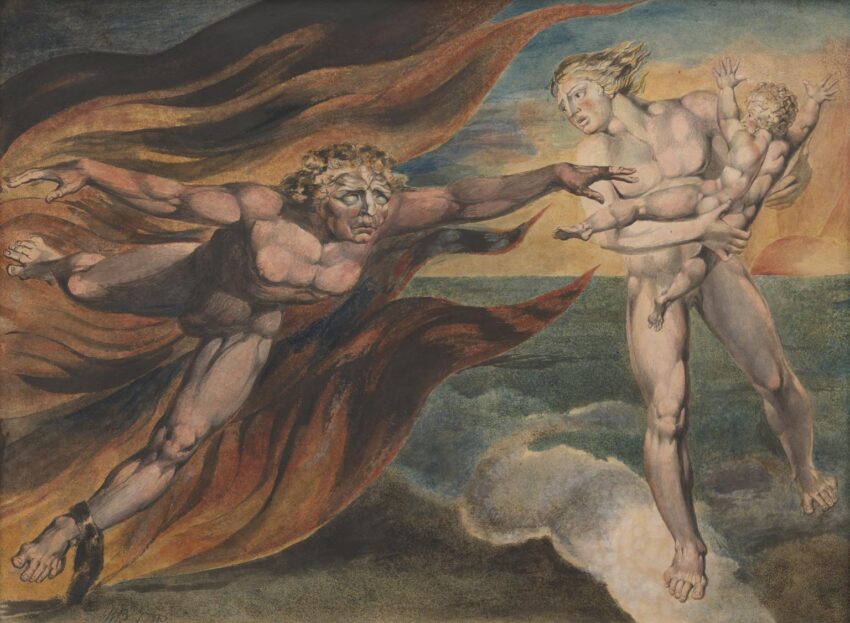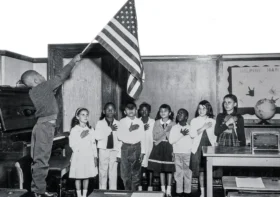When are You Yourself?

The Good and Evil Angels (1805) by William Blake
When are you yourself? You might be tempted to say, “always.” Yet, if I were to catch you in the act of the worst thing you have ever done, you would likely tell me something to the effect of, “Well, that’s not the real me.” You’d go on to explain that, “The real me is [kind, loving, faithful, patient, etc.].” And, naturally, most people would agree with you. This is a very common sentiment. For example, when confronted with an act of islamic extremism, such as a terrorist attack, many would say, “That’s not real Islam.” Or, when a beloved musician puts out a poor album, we would say that album was not representative of the artist himself. So, I ask again: when are you yourself?
There are only three answers to this question.
(1) You could play the contrarian and argue that we, indeed, are ourselves in every moment, for better or worse.
(2) You could argue our true selves are only discernible from a distance off, almost as if the true “you” is best found by averaging of all your thoughts and actions over the course of a month, year, decade, or even lifetime.
(3) Lastly, you could simply claim we are our true selves at certain, particular moments.
The odd thing is that all three answers are technically correct (although one is distinctly more pragmatically useful than the others). Let’s take each position in its turn.
(1) On the Christian worldview, our souls are on display in every waking moment (barring demonic possession). The good, the bad, and the ugly are equally valid products of the soul. How? Because our souls possess an inherently good nature which bears the image of God, yet they have been corrupted by (original) sin, which accounts for the bad and ugly. There is no shirking responsibility. We have not been granted the luxury of writing off our ignoble actions and desires as those of another. Even still, this first answer to our query is effectively useless. After all, it doesn’t help us define ourselves in earnest or with any degree of accuracy. For example, I’ve been known to buy a family sized bag of chips, which I finish within an hour. Inside the course of that single hour, I will go from someone who adores chips to someone who might vomit if I eat even one more. Am I to believe both are equally real representations of the actual me? Or take the case of a faithful wife of 40 years. She may indulge a minute of passing lust for another man. Is “disloyal” an equally accurate descriptor of the wife as “faithful”? Decidedly not.
(2) Rethinking things thus, you might say that we should average out the thoughts, desires, and actions of a person over some period of time. I call this the “Wikipedia” approach because the subsection length in biographical wikipedia articles are typically proportional to the duration and/or intensity of whatever aspect of the person’s life said subsections are discussing. Well, what works on paper doesn’t always translate so well to living, fickle humans. For example, I’m sure if you were to take the great plurality of skills my 7 month old son has possessed over the course of his whole life and blend them into one representative sample, the ability to crawl would constitute a very small percentage of that admixture. Yet, at the time of this writing, his ability to crawl would be among the very first characteristics I would mention when describing him to a stranger. (He crawled for the first time about 50 minutes ago.) Likewise, an old, lifetime atheist who had recently given their life to Christ would take great offense at any attempt to define them as anything but a child of God. Needless to say, the duration and intensity of our thoughts, desires, and actions are highly variable and, when averaged, make for a poor metric of our true selves.
(3) That leaves just one remaining answer to this question, namely that we are our true selves only at select moments. As previously stated, most would agree these defining moments would not be our worst. By the same token, I think we can say with confidence that they would not be our best either. For one thing, we are sinful by nature, so any picture of ourselves, if it be accurate, ought to be sparing with the sugar and sparkles. I don’t think you can work around this problem of skewed cross-sectionality by claiming our last moments are our truest either. Martin Luther likely died a scathing antisemite, yet the rest of his life, Christian character, and corpus of writings all testify against this bizarre aberration from holiness. Similarly, I see dementia patients nearly every day who resemble very little of the person they once were. Instead of our best, worse, and final moments, I think we might say we are our most true selves when we are most absent and unaware of ourselves. This paradox is true of all people. What comes most effortlessly to the wicked man is sinning; it’s almost automatically. He curses without even realizing it, and he must concentrate a great deal when required to refrain from profanity. The alcoholic can practically walk to the fridge and drink a beer in his sleep, yet abstaining takes great effort and awareness. Likewise, the artist becomes lost in her painting, often emerging from her trance only after many hours of blissful work. The seasoned runner sinks into a steady rhythm and becomes unaware that he is even running. I even have a friend with OCD that, in his youth, expressed itself in dermatillomania (compulsive skin picking). He confessed to me that he would stand in front of the mirror picking his skin for hours, emerging on the other end of that time with a bloodied face and the sense that only 15 minutes had passed.
Perhaps the best way to gauge who you are and, more importantly, who you should be, is to critically scrutinize some such moments where your self dissolves into whatever thought or activity you are engaged in. The reason you feel absent from those moments is because it is not you having that experience but rather the experience that is having you. Our thoughts, desires, and actions become so deeply ingrained in us that they become the noun, and we become the verb. My friend did not have anxiety; anxiety had him.
This is easiest to see in the lost, broken, and corrupted. It is plain to everyone how gambling, for instance, controls the gambler and not the other way around. It’s a form of possession, really. In this way, every person is possessed by a great multitude of things. Chief among those things are our vices. You might say we are all born possessed by the Old Adam. Unless you are born again and transformed by the renewal of your mind through submission to the New Adam, you will be totally consumed by sin and death. Perhaps none described this phenomenon better than C. S. Lewis, both in The Great Divorce and here in Mere Christainity: “Hell begins with a grumbling mood, always complaining, always blaming others… but you are still distinct from it. You may even criticize it in yourself and wish you could stop it. But there may come a day when you can no longer. Then there will be no you left to criticize the mood or even to enjoy it, but just the grumble itself, going on forever like a machine. It is not a question of God ‘sending us’ to hell. In each of us there is something growing, which will BE hell unless it is nipped in the bud.”
So, what does the alternative, “possession” by the New Adam, look like? In a word, it looks like a saint. A saint is one in whom God becomes the actor and man the action. A saint is one where body and soul become vessels through which the Lord moves. Saints are selfless because for this very reason. More often than not, they are simply and wonderfully unaware of themselves. If death is the end of an unbeliever, then what awaits the saint is nothing short of theosis (or, if you prefer, Christification): participation in the divine nature.
You may not be aware of it, but whether saint or sinner, your life is punctuated by moments where you lose track of time and, with it, your very self. If these moments aren’t obvious to you, watch yourself for one week, and write down every instance when time seems to whiz by (or disappear altogether). Be sure to note what you were doing or thinking when this happens. You may find that this exercise makes for an unsettlingly clear mirror for viewing your true self. That’s the point. If you don’t like what you see, turn to the Lord in prayer. Repent of your sins. Read the Scriptures. There you’ll see not what but who you ought to look like, and his name is Jesus. Give yourself to Him completely.




Leave a Reply